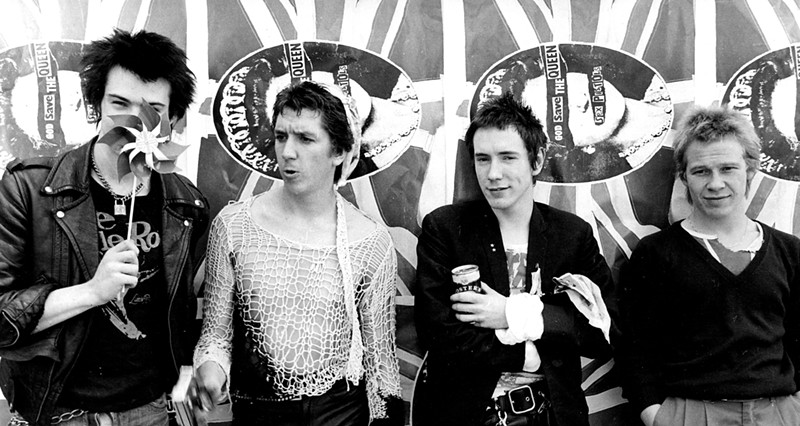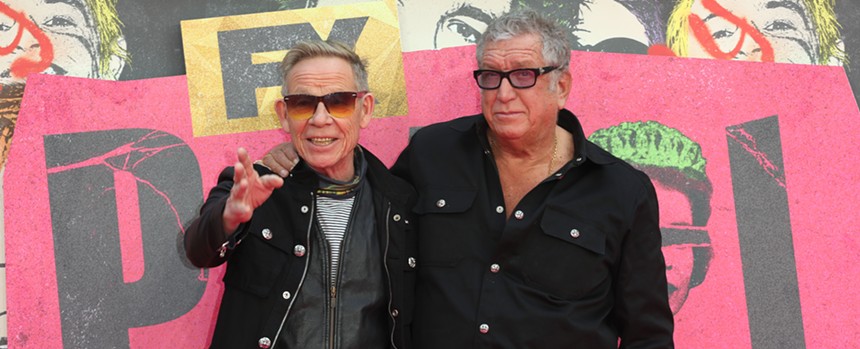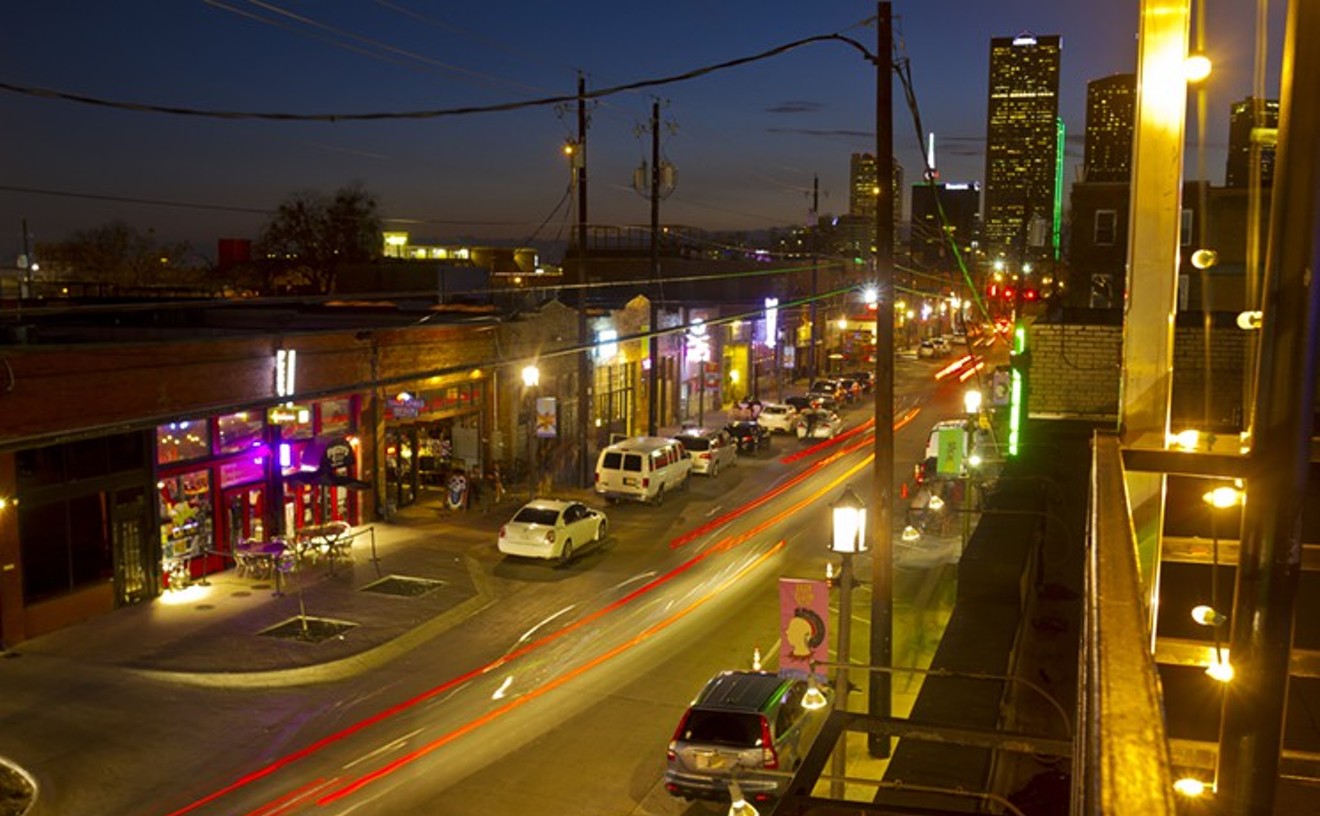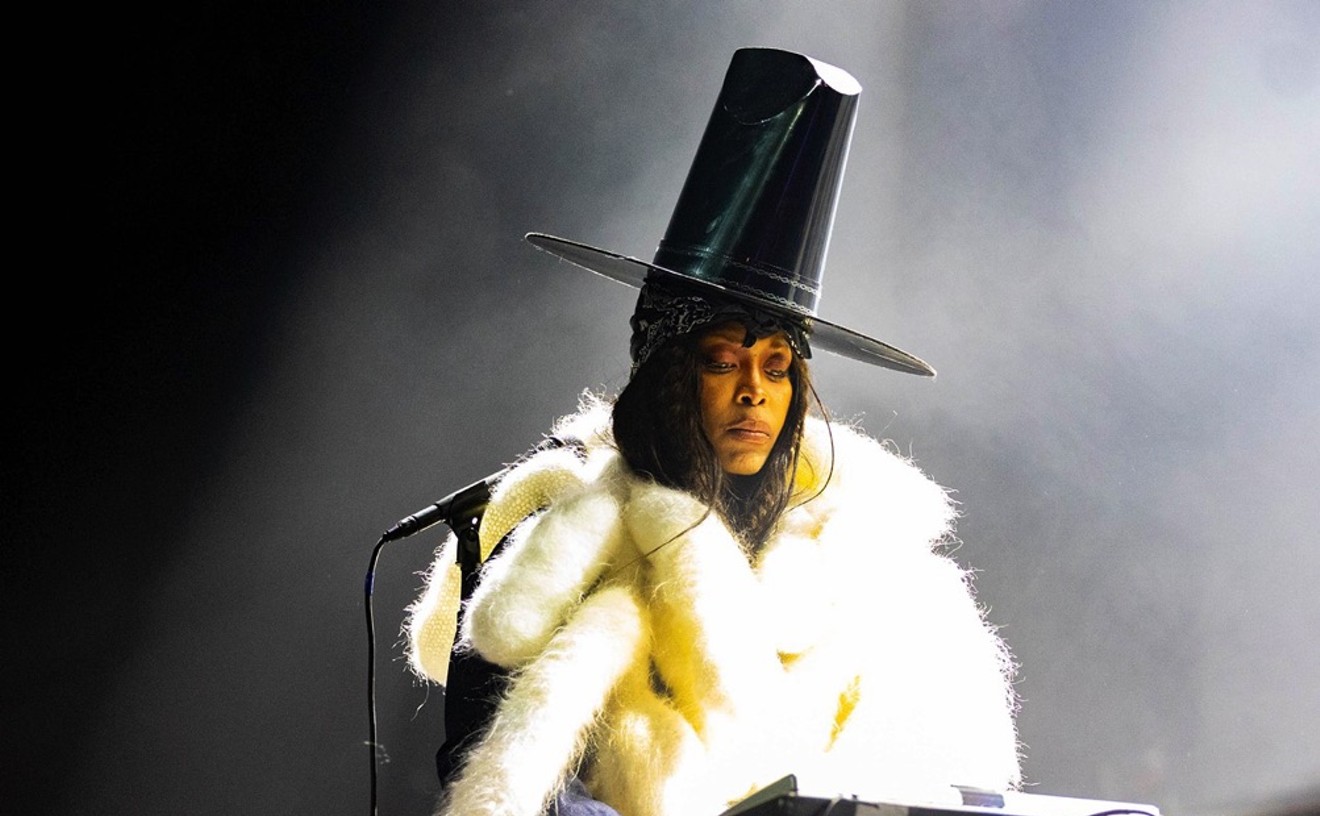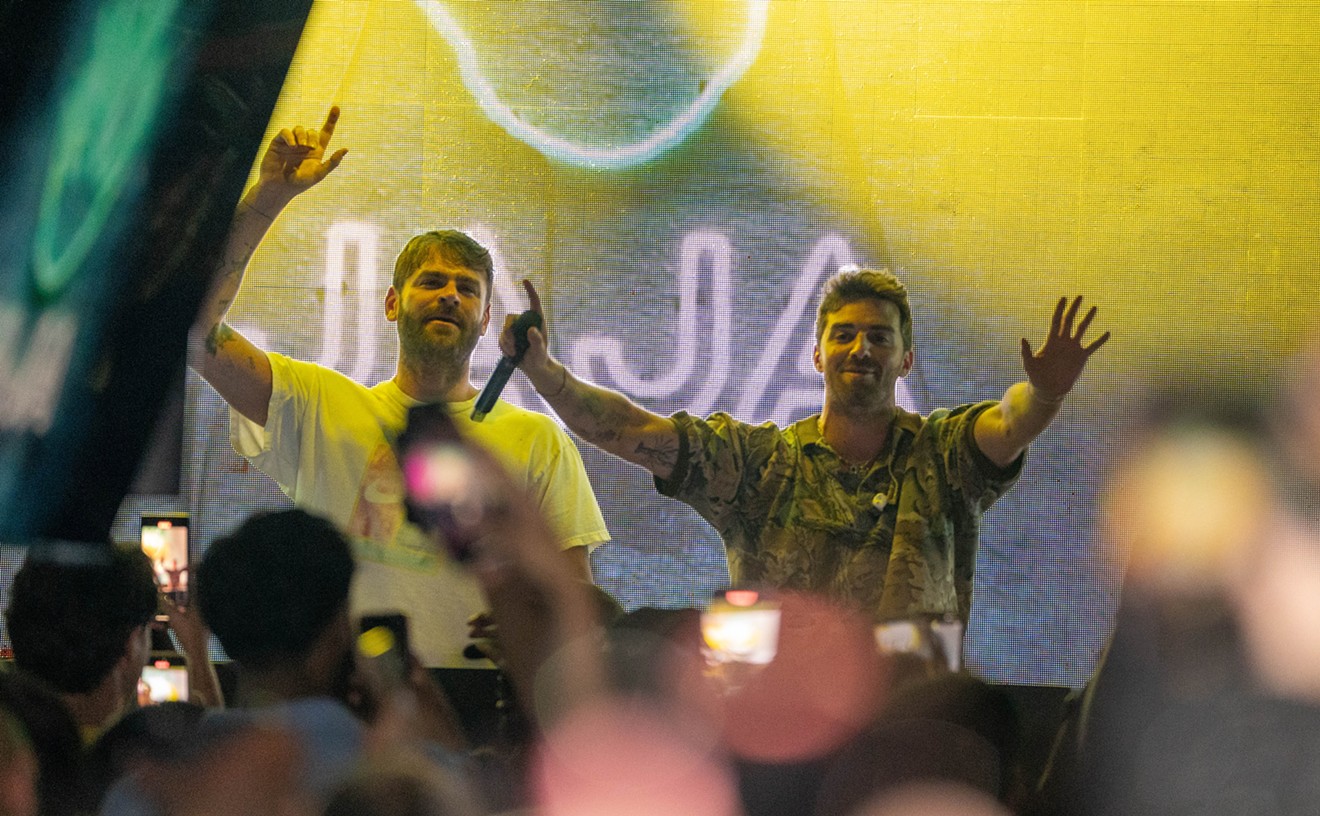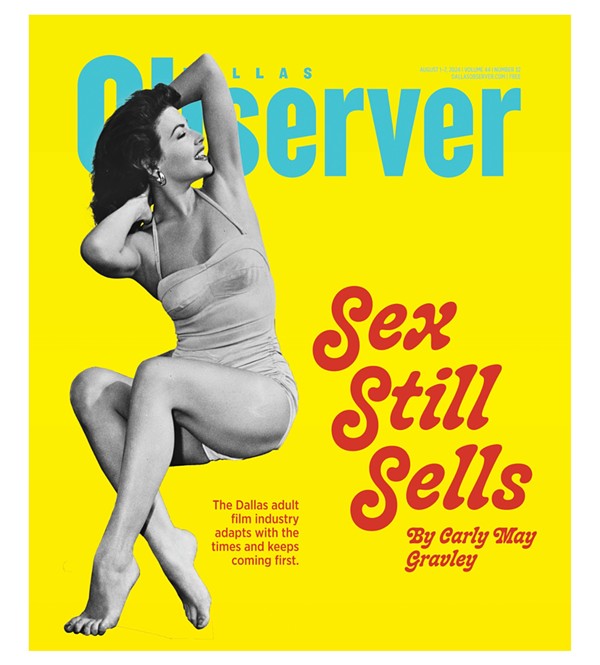For the rest of us, the group’s name alone unwraps a pin-held patchwork of images that encapsulate an era and an entire movement. The burning mania of frontman Johnny Rotten, the artwork of seminal album Never Mind the Bollocks and the fatal pairing of Sid and Nancy — all of it comes to mind before the thought of Sex Pistols guitarist and founder Steve Jones.
In the past few weeks, however, Jones has become the protagonist in the Sex Pistols story through Pistol, a limited six-episode series directed by Danny Boyle. The story of the Sex Pistols has been told through various vantage points, but the show is based on Jones' memoir Lonely Boy: Tales From a Sex Pistol, in which he recounts a life of childhood abuse, near lifelong illiteracy and sex addiction.
Though the Pistols were icons of the unorganized anti-establishment league, to celebrate Queen Elizabeth's Platinum Jubilee the group released a commemorative NFT, and to capitalize on the momentum of the show, Universal recently released Sex Pistols: The Original Recordings, a 20-song collection that includes classics from Bollocks such as “Anarchy in the U.K.,” B-Sides and covers.
Jones spoke to us from his Los Angeles home, where he came to seek sunlight nearly 40 years ago. His cockney voice, however, is intact and makes him sound not a day out of London.
“We got a new deal with Universal. They wanted to re-release a bunch of the stuff,” he says. “There's some rarities on there. If you're a fan, you’ll probably enjoy it. I don't know, I think it's to coincide with the Pistol TV show, of course. I personally don’t care to listen to the Sex Pistols. I’m over it. But, like I said, if you're a fan, you probably will like it.”
Jones is not over the band’s story, however. As Boyle captured in his dramatized version of events, the Pistols led a true Russian roulette of a life, their rise in the punk movement fast and fatal as a bullet. Rotten, aka John Lydon, also lives in Los Angeles these days and in a delightfully bizarre turn in the pop culture multiverse, he was once a plaintiff on an episode of Judge Judy. But don’t expect to see the pair shopping for wheatgrass juice together at Whole Foods: Lydon tried to stop the series’ production, essentially, by refusing to license the band’s music. A judge ruled against him. Lydon criticized his former bandmates for cashing in on their story and called the series a “middle-class fantasy.”
Jones has gone on to have a brilliant career beyond the Pistols, playing with Iggy Pop and Bob Dylan and as a part of supergroups that included Guns N’ Roses members. So he’s since expanded his repertoire.
“It's not that I don't [enjoy it]; there's only so many times I can listen to Sex Pistols music,” he says. “We don't have a huge catalog to be honest with you. So, you know, I personally would rather listen to Steely Dan than the Sex Pistols.”
Though Lydon has admitted to not having seen the series, some music history purists are on his side, and were let down by the creative license taken by Boyle.
Though it’s based on Jones’ book — and it’s not unsurprising that those early punk days may be blurry — Pistol is a bit of a multi-genre collage with which Boyle goes beyond laying the cultural context of the time and almost seems to explain the '70s with every bit of inspiration at his disposal: It’s filthy, crusty and exhilarating, but with a kind of camp unique to musical theater, sprinkled with old news clips and fantasy vignettes. At times it feels more Baz Luhrman than Danny Boyle.
Jones has said many times that fans should view the series as less of a biopic and more of its own work of art. And he’s right. Those who can appreciate Pistol for its textured storytelling will get a fascinating view of the era through disarming characters that include punk icons Jordan, Vivienne Westwood and Chrissie Hynde.
“I’ve always thought it’s great,” Jones says of the show. “From the first time I saw the rough cuts of it I always enjoyed it and I think its final — uh, what’s shown to everyone else — I think it's great, I really do. I love it.”
Pistols manager Malcolm McLaren (played by Game of Thrones’ Thomas Brodie-Sanger) is portrayed as a marketing mastermind who cherry-picked the band to suit his revolution, much like Simon Fuller cast the Spice Girls. McLaren’s bloody-raw vision for the band was to stir up shit through a U.S. tour, and he deliberately kept them away from punk meccas such as CBGB and only booked them in the South when they toured the country in 1978. One of those infamous concerts was at Dallas’ Longhorn Ballroom, which is depicted in the series.
And all sorts of shit got stirred. Far from throwing nutritious fresh tomatoes, crowds spat on and heckled the band, and bassist Sid Vicious got a bloody nose onstage from a member of the audience. But that seems now a standard Pistols show, and Jones says he came to expect it.
“I don't think there was ever a sit-down, well-behaved crowd,” Jones says. “We just don't ignite that when we play, you know. It was all right, I mean, we're not, you know, [‘50s crooner] Perry Como. …. It was more about people not liking us. I would say that was more of what it was like when we first came to the States, there are a lot of people who came to see us who just wanted to see what the circus was in town. They didn't necessarily want to be there because they were fans.”
Despite Lydon’s protests, the show makes the singer out as a sort of underappreciated wild genius.
“I mean exactly, it made a point to not … you know, in his mind, though, he probably thought we were going to depict him in not a good light, which wasn't what we wanted to do,” Jones says. “It was just telling my story as best as I could from my autobiography. And I think the fact that he wasn't in control is what he was probably more upset about than anything else. These singers, they’re all the same. They’re all narcissists. You have to [be]. That's part of the gig.”
For all the band’s mishaps, there’s nothing Jones would do differently now, he says.
“No, it was good. Short-lived,” he says. “It was a little spark in music for a couple of years to change the course of music and fashion and asking questions. It was great for a couple of years and then imploded, and I don't think there's anything wrong with that.”
Much of the societal ills at the time of the band's raging are still the same, plus we’ve piled on some new ones. Jones doesn’t think the Sex Pistols would be rebelling against anything much different if they'd come out today.
“Well, the issues are always the same,” he says. “It doesn't matter if it was in the ‘70s or right now. It’s always the same crap that's going on in politics.”
The pomp and pageantry of the English monarchy obviously contrasts wildly with the band’s working class anti-heroism, and it's possible that — thanks to figures such as Meghan Markle and Princess Diana — public perception has shifted to come to see the Pistols as the more virtuous English icon. Jones doesn’t care, symbolically or not, whether the queen is “saved.”
“I never cared about it one way or the other; I never have,” he says. “To me it's just a soap opera. … That was John writing about that. I couldn’t care less about it, that was my view, but John wrote the words, you know, ‘God Save the Queen,’ which is great lyrics but me personally I literally couldn't care less about the royal family. They’ve never done me any favors.”
Even after seeing his life unfold on screen and on the page, Jones doesn’t have a particular standout moment.
“Not really, I mean, playing with Bob Dylan was fun,’ he says. “I wish I could have played with Elvis Presley. That would have been fun.”
Elvis was only part of the American appeal for Jones. He found Los Angeles was the warm opposite of the environment that made him famous.
“All right, when I came from England, and I was a mess, L.A. to me was like, I've never experienced anything like it with the sunshine and the ocean, and the wide open spaces and the glamour of Hollywood,” he says. “And it was like going to some other planet. It was, you know, coming from where I came from — dingy, rainy, damp, London at the time — it was like, oh man, this is amazing. I got to move here.”
"These singers, they’re all the same, they’re all narcissists. You have to [be]. That's part of the gig.” –Steve Jones
tweet this
The City of Angels has certainly lived up to his expectations. (“I’ve been here 36 years,” Jones says. “If it hadn’t, I don’t know what I’m doing here.”)
Looking back now, especially through a closer view at McLaren and Westwood, it seems as though there was a lucid, conscious strategy and certainty that the Sex Pistols were going to be massively influential, as the originators of more than a music genre, but the soundtrack to a movement that, as Jones noted, comprised fashion and philosophy. But Jones just wanted to play guitar and have some fun.
“We were all very young, and we were having a great time, and you didn't live for the future, you lived in the moment,” he says, “when you're 19, 20 years old, and it was a great time to be alive and it was amazing. It really was, looking back on it. Yeah, you forget when you're that young … you're fearless when you’re that young. You don’t know shit but you also feel … I think rock and roll is a young man’s game, personally I don't want to be playing at my age at 66. Whenever I see bands … old … I think they look kind of stupid.”
Then again, Steely Dan is still touring.
“That's different,” Jones says, raising the point that Steely Dan is far more mellow. “I mean the guy, [singer Donald] Fagen, sits down on the piano. He's not jumping around like a lunatic.”
Jones was an executive producer on Pistol, but he says he wasn’t nit-picky about details such as casting.
“I let it all go, man,” he says. “I'm a big believer of, you know, staying out of the process, especially when you got someone like Danny Boyle at the helm, you know.”
The lethal romance between Sid Vicious and Nancy Spungen has become its own legend, and even her unsolved death by stabbing and Vicious’ fatal overdose soon after have not detracted from the group’s legacy.
Jones never worried that it would.
“No, no. It is what it is, and Sid was in the band, Nancy came along, it was a dark cloud,” he says. “It was all part of it, it was the truth. It's not like we're making stuff up. I wasn't a fan of him when he started doing heroin and that whole situation, plus he couldn't play — he looked great, and it's just one of them things, you know?”

